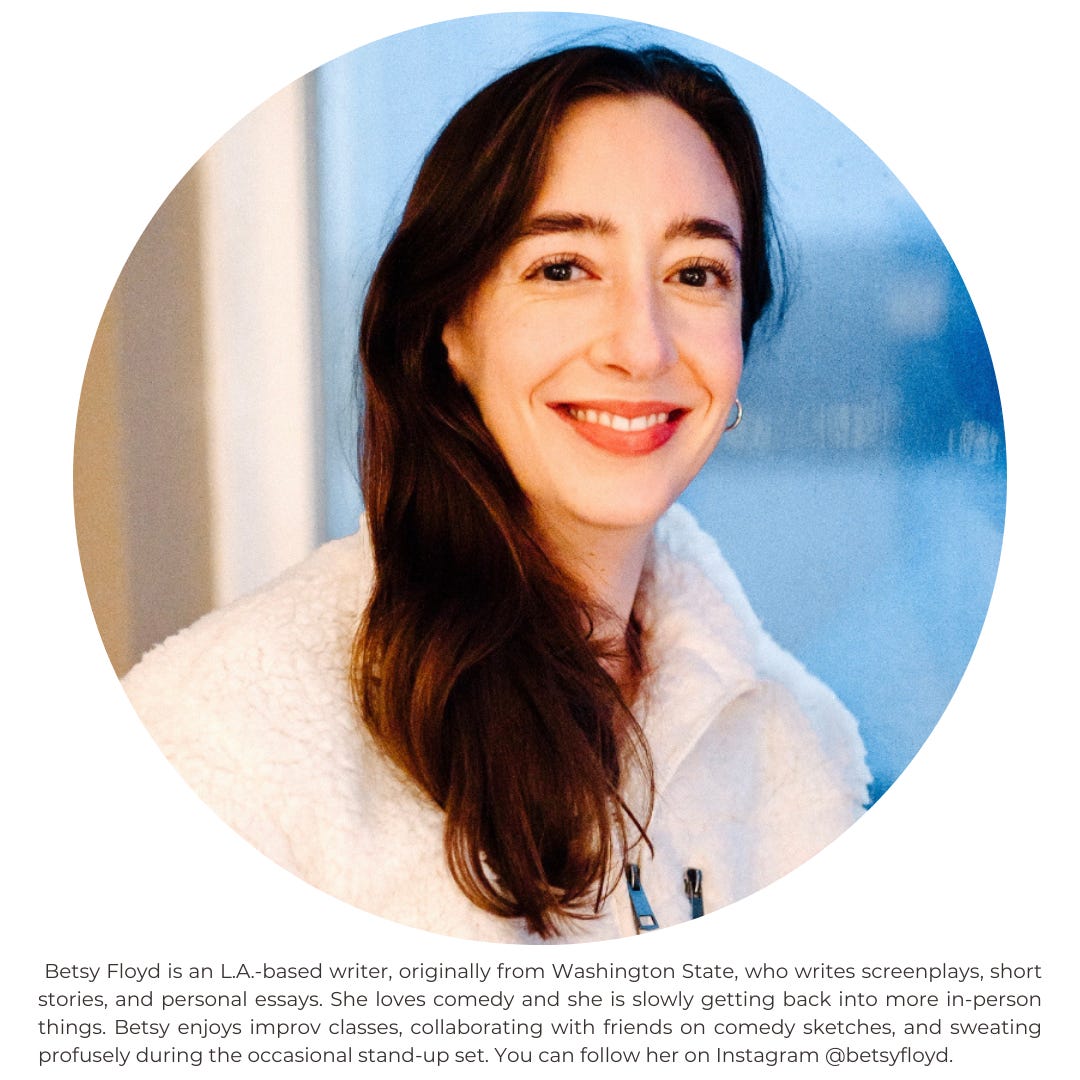Welcome to The Learning Curve, a weekly newsletter to share our understandings, joys, and learnings through personal narrative. Our writers span many generations, cultures, identities, and ethnicities.
We’d like to welcome our recent new subscribers! If you haven’t subscribed yet, please join us!
Happiest of Wednesdays!
In what seems like many, many years ago now, I was fortunate enough to work alongside a student, Betsy Floyd, on a retreat during her senior year. By that point, I had been teaching high school English for many years and had read a lot of students’ essays. As writing teachers know, every so often, some students’ words can catch you and make you take notice. And that year, for me, those words belonged to Betsy. Sure, her crafting of structure was advanced and her subject was carefully planned, but what stopped me was her voice. At the young age of 18, Betsy had already found her voice and it was a unique one at that. Self confident, assured and steady, her tone and cadence had no correlation to her youthful age. I was thrilled to see that her voice, all these years later, has only gotten stronger and more pronounced and I’m so happy to share her work here today. —Molly
"You don't have to be extreme. Just consistent."
I’m an unabashed self-help junkie. It’s easy for me to own this interest and share it with the world because the industry and culture of self-help in American society has exploded in recent years. It was once relegated as embarrassing, corny and mostly for desperate middle aged divorcés.
At least, that’s what 90s rom coms told me.
Today, no one is stuffing self-help books under their arms and sprinting out of book stores. We’re quoting our therapists, summarizing Brenè Brown’s latest podcast episode, and spilling our souls on social media—I’m guilty of all the above.
What drew me to self-help was probably similar to why many other people are too: The distinct feeling there was something in me that’s broken. The way I lived life felt wrong. Things shouldn’t be this hard, uncomfortable, this unbearable.

I was convinced that a calmer, happier, more capable, more creative version of me existed—I just knew it. My ideal self is as follows: She isn’t as anxious as I am, she’s got a better handle on her temper, she’s not a people pleaser and basically, she has the diplomacy and poise to successfully lead a small country.
Why does my fantasy self involve political aspiration? I can't say why, given that at most I skim politics-related headlines.
You can imagine my disappointment when I didn’t turn into this perfect me à la Cinderella. Brenè Brown isn’t my fairy godmother and my therapist is a human, not a miracle worker. But why in spite of my efforts, wasn’t I simply…better?
A few months ago, I stumbled upon a profound truth that seemed to answer this perpetual question of dissatisfaction. I was listening to a podcast on self-compassion with psychologist Dr. Kristen Neff (I told you, self-help is the air I breathe) that was hosted by Hidden Brain. When sharing her own story, Dr. Neff quoted this term called the “paradox of acceptance,” a concept coined by psychologist Carl R. Rogers.
Here’s Rogers’ famous quote: “The curious paradox is that when I accept myself just as I am, then I can change.”
When I heard her say this, I paused. Then, I played that bit over and over again, letting the weight of it sink in.
All these years of waiting for this incredible version of me to show up.. and she wasn’t going to? The person I’m wanting to be is already in me, toddler-style tantrums and all?

To be honest, I’m still confounded by it. How can I change and also accept the fact that I smush together five cuss words into a single, gibberish-like swear word when I’m driving around L.A.?
While I’m still wading into this paradox, I can say that it has brought me more peace and perspective. I have moments of clarity when I look over and read the Carl R. Roger quote written on a notecard and taped to my wall, for the zillionth time.
Accept. Accept. Accept.
Because, let’s face it: This perfect woman I was supposed to become never existed in the first place anyways.
Betsy’s Five Favorite Things
The podcast Maintenance Phase by Aubrey Gordon and Michael Hobbes. They're two fantastic cultural critics/journalists who, every week, debunk food fads, health/wellness trends and messaging about body size & weight loss that permeates throughout American society.
I Came All This Way to Meet You by Jami Attenberg. It's a moving memoir of a writer's life and an exploration of what it means to be a writer, a woman, a human.
Self-care #1: Yoga with Adrienne videos on Youtube. I've been dealing with various health issues lately, and she's got a yoga video tailored for all kinds of aches and maladies.
Self-care #2: Dr Teal's Melatonin Sleep Foaming Bath. It'll turn your bathtub into paradise. It's the perfect thing to unwind, it smells so good and it does help with sleep.
My favorite tea ( or arguably self-care #3): Tazo Chai Latte concentrate. It's the same as what Starbucks uses, only you don't have to pay $4 for it. Just add to your milk of choice and enjoy a latte in the morning.
With gratitude,
Betsy Floyd
P.S. At what age did you realize the real you had been inside of you the entire time? What caused this realization? Share with us below in the comments.




I don't think I have realized it yet, but I am getting there.